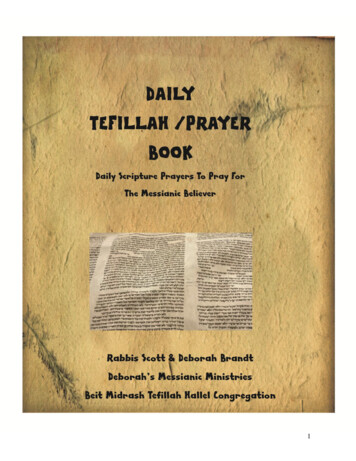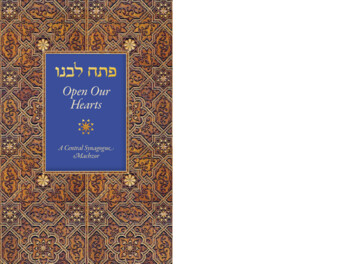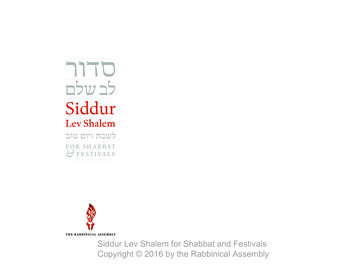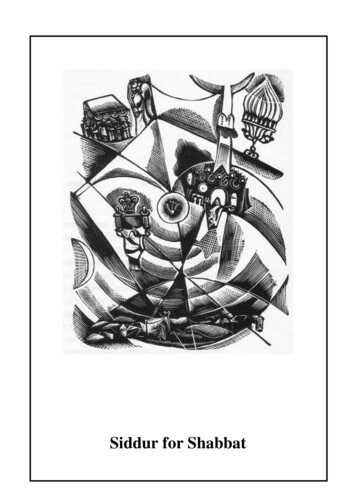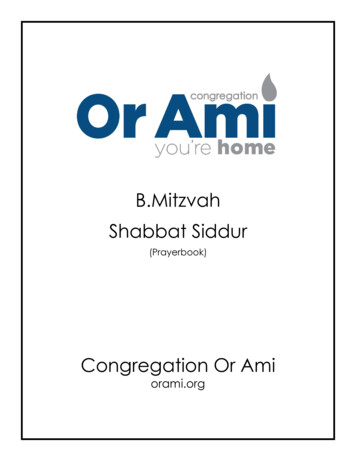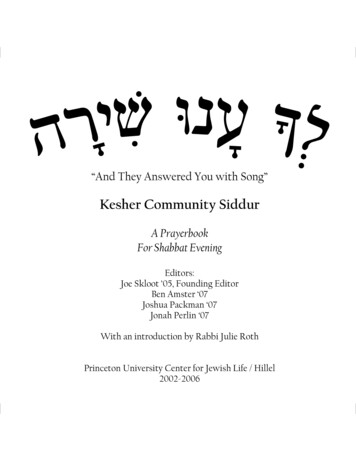
Transcription
“And They Answered You with Song”Kesher Community SiddurA PrayerbookFor Shabbat EveningEditors:Joe Skloot ’05, Founding EditorBen Amster ‘07Joshua Packman ‘07Jonah Perlin ‘07With an introduction by Rabbi Julie RothPrinceton University Center for Jewish Life / Hillel2002-2006
INTRODUCTIONIt is with great anticipation and joy that we present this siddur to the Reform JewishCommunity at Princeton. We want you to be proud to have this text as your own andhope that you are able to find inspiration from it for many years to come. The PrincetonReform Siddur Project began in 2002, before the current co-chairs matriculated, and it isan honor to be able to complete this endeavor.Before the first word of the prayerbook was written, there was a desire to produce adocument that reflected both our desire to include as much of the traditional liturgy aspractical and a firm commitment to include user friendly translations and personalmeditations as well. For that reason, we have included the entire Kabblat Shabbat serviceas well as many additional songs and thoughts in the margins to encourage future serviceleaders to explore various aspects of the liturgy from one week to the next.The dilemma we faced when debating the extent to which our prayerbook would betraditional and the extent to which it would reflect our more liberal values revolvedaround our desire to allow individual worshipers the ability to draw their owninterpretations from traditional texts. In our opinion, translating with poetic excellenceor a desire to change the meanings of words for political correctness would create aprayerbook in which the part of the responsibility upon the reader has been limited bythe writer. On the other hand, we felt that the traditional use of gendered terms,especially in descriptions of God, and certain messianic references would represent ajudgment on behalf of the prayerbook best left to individual worshipers.Our desire to allow individuals the ability to shape their service is also reflected in ourdecision to include the entire Kabblat Shabbat service. Though in the past the amount ofvariation in our weekly service has been only one or two tunes, by including far more ofthe liturgy than we have ever used in one week, we allow future service leaders to pickand choose a unique combination of prayers and melodies from week to week.It has also been a challenge to create a prayerbook that is uniquely Princeton. Whereverpossible we have tried to use the words and wisdom of members of the Princeton Jewish2
community. To that end we would like to thank all those who submitted readings fortheir contributions. The origins of passages from known sources accompany thosereadings in the text. Many of the songs and readings, especially those of unknownauthorship, have been provided courtesy of the service templates on the Kesher website.We would also like to thank Kesher for their financial support for this endeavor.Penultimately, this prayerbook would not have been finished had it not been for thetireless support, encouragement, proof-reading and, as you will see on the next page,forward-writing of Rabbi Julie Roth.Finally, though we are responsible for the completion of this prayerbook, the vastmajority of what follows is the result of the vision and commitment of Joseph Skloot ’05.It is because of his hard work and tireless dedication to Kesher and the CJL that thisproject became a reality. We hope that future generations of Princetonians are able tokeep his vision of a vibrant, inclusive Reform minyan on campus alive.Many, many Shabbat Shaloms,The 2006 Kesher Co-ChairsBen Amster ’07Joshua Packman ’07Jonah Perlin ’073
FORWARD BY RABBI JULIE ROTHWhen I was a child, Shabbat was about chicken soup and home-made challah. MyUncle Milton would come to dinner every Friday night and we would eat in theDining Room. Week after week, my family would stand together, singing the words ofthe Kiddush. I didn’t know what the words meant and it didn’t matter – I knewShabbat was a special time and I looked forward to it every week.It wasn’t until I went to college that Shabbat took on the added dimensions offriendship and community and became a much-needed day of rest. At first for a fewhours on Friday nights and eventually for an entire sunset to sunset, Shabbat becamethe day of the week where I found a respite not only from work, but from worryingabout work. Slowly, slowly on Friday nights I would let go of the stresses of the weekthat passed, remembering that I am more than what I do, that there is more to life thanachievement and work.Over my four years in college, I came to realize that Shabbat is the greatest gift of theJewish people. It is a time when we give ourselves permission to slow down from thefrantic pace of the week, to gather in community, to look inward, and to remindourselves that each one of us was created in the image of God. We rest on Shabbatbecause “on the seventh day God ceased from work and rested.” How powerful it is toaffirm that taking a break from studying and writing papers and even from the sacredwork of making the world a better place, is an imitation of God.God models for us that we deserve the blessing of taking a break from our work eventhough there is always more work to be done. In the six days that God created theworld God saw that “it was good” or at best that “it was very good”, but not perfect. Bycreating an imperfect world, God allows us to strive for wholeness rather thanperfection. Embedded in the idea of a Shabbat Shalom, is the type of inner peace thatcomes from focusing not on what is missing, what is wrong, what is broken, but what isthere, what is right, what is whole. We learn from the words of the Kiddush, “ThenGod blessed the seventh day and called it holy, because on it God ceased from all thework of creation.” The blessing and holiness of Shabbat is inextricably linked to thecessation of work, to the art of being satisfied with who we are and appreciating the4
blessings that are already in our lives.Shabbat is a sacred time where the sanctity of time itself is savored. These preciousyears at Princeton are a gift, marked each week by the holy Sabbath. Use this timewisely – not only to do but also to be. Let Shabbat be a time not only of relaxation, butalso of re-creation. Help us to use this hour of prayer not only for self-discovery, butalso for self-transformation. May this Shabbat be a sanctuary of time. In the words ofAbraham Joshua Heschel, may this Shabbat be a day when we answer the call “to sharein what is eternal in time, to turn from the results of creation to the mystery of creation;from the world of creation to the creation of the world.”Shabbat Shalom,Rabbi Julie RothExecutive Director, Princeton Center for Jewish Life5
GENDER IN THE JEWISH LITURGYUnlike English, Hebrew is a gendered language. Though many of us read and chantprayers in Hebrew, our understanding of them can be muddled due to this barrier.Recently, modern translations have replaced “Lord” and “Father” with “God” or“Creator,” but this does not alleviate the issue in the heart of the traditional prayers.How often do even the most conscious individuals sing Avinu Malkenu withoutrecognizing the ode as one to “our Father, our King?” For thousands of years ourancestors have prayed to a male God, despite claims of genderlessness. L’cha Dodirepresents one of the few examples of female imagery in prayer, yet it is the image of abride-like Shabbat coming to meet her spiritually male groom. Even in blessing our foodand wine, the masculine form of the language is ingrained in the traditional brachot.The feminist theologian Mary Daly bluntly wrote in 1973, “If God is male, then male isGod,” implying that patriarchal religion leaves women out in the cold. It is men who maygrow spiritually, who may become nearer to the image of God. No matter that woman,too, was created in Adonai’s image; Eve’s choice in the Garden of Eden relegated her sex toa lower position on the totem pole of life.Yet that is not the way our minyan or our movement operates, and for that I am thankful.We are an egalitarian group who sit alongside one another, raise our voices in song andpraise together, and even dance together. Furthermore, by virtue of our circle, there is nota front and back, or center and edges; all are equally part of our spiritual sphere. Wewelcome female rabbis and aspire to be or work with female cantors. Many of thewomen who seek peace in this shelter were themselves lucky enough to experience beingcalled to the Torah as a Bat Mitzvah, taking their place in line among hundreds ofgenerations of men and a growing number of women, and in the process finding aremarkable connection to Judaism.6
My grandfather used to explain the difference between two kinds of traditional Jews.One, of course, follows and accepts Jewish law out of a strong belief in its righteousness.The other follows these same laws not only to worship, but also to form a spiritual linkbetween us in the present and thousands of years of history. It is with this understandingthat we can find a place for women of our time. We need not infer that women are, norbehave as, a lesser, outside gender. While the words of the prayers are masculine, ourunderstanding of them as a part of tradition, rather than inherent sexist principles, helpsus to welcome women and men together into the same spiritual plane and place.Shabbat Shalom,Emily Chiswick-Patterson ’057
NOTES ON HEBREW TRANSLITERATION AND TRANSLATIONMany different prayerbooks have attempted to use their own systems to address theproblem of transliterating Hebrew sounds into an English text. For this siddur,we attempted to use a system of transliteration which would be consistent in the wayHebrew sounds were translated into English text.Vowelsָ – א transliterated as “a” – pronounced as in “the Wa”In words such as ּכָ ל , this vowel produces a different sound,in which case it is transliterated as “o” and pronounced as in “Old Nassau”ַ – א transliterated as “a” – pronounced as in “Wawa”ֵ – א transliterated as “ei” – pronounced as in “veil”ֶ – א transliterated as “e” – pronounced as in “gelt” – ִא transliterated as “i” – pronounced as in “kippa”ֹ או or א ֹ – transliterated as “o” – pronounced as in “shalom” או ּ or ֻ – א transliterated as “u” – pronounced as in “Judaism” – ְא transliterated as an apostropheThis vowel is used to indicate a stop or a schwa. An apostrophe is only usedto separate syllables in the case that this vowel appears in the word. In thecases where this vowel does not appear, a dash is used to separate syllableswhere necessary.8
Consonants – ג transliterated as “g” – pronounced as in “goyim” ח or – כ transliterated as “ch” – pronounced as in Scottish “loch”These letters produce a guttural sound. These letters are not pronounced asin “chosen.”Note that in some words כ is transliterated as “k” and pronounced as in“kosher.”DageshA dagesh forte placed in the center of a letter that is not the first letter of a wordis transliterated as a break in syllabi prior to that letter. To break up some of themore challenging consonant and vowel clusters, the symbol - is used at theeditors’ discretion to mark divisions between syllables. Thus נְ ַרנְ ּ נָה istransliterated as n’ra-n’na.TranslationNo less daunting than transliterating is the attempt to translate ancient, poeticHebrew verse into meaningful English. While many Reform siddurim take artisticlicense and provide translations that encapsulate the spirit of the original text,we feel that these translations deny the reader access to the original meaningsbehind the words. For that reason we have made every attempt to translate theHebrew as literally as possible. The one exception to this rule is that wordswhich, in Hebrew imply the gender of the reader or the Divine, have beentranslated to a gender-neutral term as close as possible to the original word.9
SHABBAT HAS COME The idea of making Shabbes is really Biblical. The Torahcommands the Jewish people to “Guard Shabbat—making Shabbat throughout theirgenerations” (Exodus 31:17). From the beginning, a Jewish vision of rest had little to do with arecreational use of leisure time. Starting with the beginning of Torah, rest was defined as a process ofre-creation. God spent six days creating. Then the Torah says “Shabbat vayinafash—God made Shabbatand God rested.”The word for rest here is vayinafash. It is a form of the word nefesh, which means “soul.” WhenGod rests, the world has soul. When we are commanded to imitate God (living up to the image inwhich we were created), the expectation is that our rest, too, will be soulful. Creating that kind of restis something at which we must work.Dr. Ron Wolfson, Making ShabbesWE ARE COMMANDED Remember Shabbat and keep it holy. Six days you shalllabor and do all your work, but the seventh day is a Sabbath of Adonai your God: you shall not do anywork, you, your son or daughter, your male or female slave, or your cattle, or the stranger who iswithin your settlements. For in six days God made heaven and earth, and on the seventh day Godrested from God’s labors.Exodus 20:8-11THE SOUL WANTS NOTHING MORE than to grow in its own ways,journeying ever closer to the Source of its spiritual sustenance. Shabbat is a weekly catapult for thesoul; it can propel us in the direction the soul wants and needs to go. Yet for Shabbat to aid us mosteffectively, we have to prepare ourselves for the journey.Moshe Mykoff, 7th Heaven Celebrating ShabbatTHE SEVENTH DAY IS A PALACE IN TIME which we build. It ismade of soul, of joy and reticence. In its atmosphere, a discipline is a reminder of adjacency to eternity.Abraham Joshua Heschel, The Sabbath10
INTRODUCTORY PRAYERS,unhsen ,ukhp,11
Introductory Prayers מה טבו ָ יך יַעֲ קֹב ִמ ְ ׁש ְּכ ֹנ ֶת ָ ַמה טֹב ּו א ָֹה ֶל . יך יִ ְ ׂש ָר ֵאל ּMa tovu ohalecha Ya-akov mish-k’notecha Yisra-el. אֶ ְׁש ּ ַת ֲחוֶה אֶ ל הֵ יכַ ל ָק ְד ְׁש ָך ְ ּביִ ְראָ ֶת ָך , ית ָך ֶ ֵ וַ אֲ נִ י ְ ּברֹב חַ ְס ְ ּד ָך אָ בוֹ א ב Va-ani b’rov chas-d’cha avo veitecha, esh-tachaveh el heichal kod-sh’cha b’yiratecha. ֹבו ּ ַמה ּט Numbers 24:5The prayer Mah Tovu istraditionally said uponentering the synagogue. אֶ ְב ְרכָ ה , וַ אֲ נִ י אֶ ְׁש ּ ַת ֲח ֶוה וְ אֶ ְכ ָר ָעה . ומקוֹ ם ִמ ְׁש ּכַ ן כְּ בוֹ ֶד ָך ְ ּ , ית ָך ֶ ֵ יְ ָי אָ הַ ְב ִּתי ְמעוֹ ן ּב . ֹשי ׂ ִ לִ ְפנֵי יְ ָי ע Adonai ahav-ti m’on beitecha, um-kom mishkan k’vodecha. Va-ani esh-tachavehv’ech-ra-a, ev-r’cha lif’nei Adonai osi.ָ ענֵנִ י ּבֶ אֱמֶ ת יִ ְׁש , אל ִֹהים ְ ּב ָרב חַ ְס ֶ ּד ָך . עך ֱ , ֵעת ָרצוֹ ן , ְת ִפ ּל ִָתי לְ ָך יְ ָי , וַ אֲ נִ י ֲֶVa-ani, t’filati l’cha Adonai, eit ratzon, Elohim b’rov chas-decha, aneini be’emetyish’echa.There is noinconsistency betweenloyalty to America andloyalty to Jewry. TheJewish spirit, theproduct of our religionand experiences isessentially modern andessentially American.U.S. Supreme CourtJustice Louis Brandeis,“Zionism is Consistentwith AmericanPatriotism,” 191512
לך ענו שירה MAH TOVU—O HOW GOODHe who wants to enterthe holiness of the daymust first lay down theprofanity of clatteringcommerce, of beingyoked to toil He mustsay farewell to manualwork and learn tounderstand that theworld has already beencreated and will survivewithout the help of man.Six days a week wewrestle with the world,wringing profit from theearth; on the Sabbath weespecially care for theseed of eternity plantedin the soul.Abraham JoshuaHeschel, The Sabbath13O how good are your tents Jacob, your dwellings Israel.I, by Your great righteousness, enter Your house, I kneel down by theshrine of Your holiness reverently.Adonai, I love the abode of Your home, the place of the sanctuary ofYour glory. I kneel down and I prostrate myself, I bless before Adonaimy maker.I offer my prayer to You Adonai, at this time of favor, God full ofrighteousness, answer me with Your saving truth.
Introductory Prayers שירים מוספים ּנָ ִעים - ּטוֹ ב ּומַ ה - ִה ּנֵה ַמה שבֶ ת אַ ִחים ּגַם יָחַ ד ֶׁHineh ma-tov uma-na-imShevet achim gam yachad Whenever God hearsIsrael’s song, God callsthe Heavenly host tolisten.Abraham Z. Idelsohn,Jewish Music: Its HistoricalDevelopment ַׁשבָּ ת ָׁשלוֹ ם , ּיָפֶ ה הַ ּיוֹ ם - ַמה ַׁשבָּ ת ָׁשלוֹ ם , ַׁשבָּ ת ַׁשבָּ ת ָׁשלוֹ ם Ma-yafeh hayom, Shabbat shalom (2x)Shabbat, Shabbat shalom (3x)Shabbat Shalom לו ּ ְ לו הַ ל ּ ְ לו הַ ל ּ ְ הַ ל ּכֹל הַ נְ ּ ָׁש ָמה ְּתהַ ּלֵל י ָּה לוי ָּה ּ ְ הַ ל Hal’lu hal’lu hal’luKol han’shama t’halel yaHal’luya. לו ּ ְ הַ ל Psalm 150Up to a certain point itis good for us to knowthat there are people inthe world who will giveus love andunquestioned loyalty tothe limit of their ability.I doubt, however, if it isgood for us to feelassured of this withoutthe accompanyingobligation of having tojustify this devotion byour behavior.Eleanor Roosevelt14
לך ענו שירה ADDITIONAL SONGSAbove all we fullyrecognize that thehymns should besingable, within thegamut of the averagevoice, and garbedwith easy, intelligibleharmony.It is our ardent hopethat it will help educateour congregations in thebeauties of our musicalheritage, and leadthem God-ward on thewings of song.May these moments ofmeditation strengthenthe bonds that bind usto our people; may theydeepen within us a senseof our responsibilityas Jews.The Union Hymnal: Songsfor Prayer and Worship,CCAR, 1946Behold, how good and how pleasantit is for brothers to sit together. How beautiful is the day! Shabbat shalom (2x)Shabbat, Shabbat shalom (3x)Shabbat Shalom. Praise Praise PraiseLet all of the soul praise GodHalleluyah! Source of all goodness, as we join in Shabbat worship,We ask your blessings.Grant us health enough to perform our daily tasks,Wealth enough to answer our needs,Compassion enough to feel the needs of others.Give us strength enough to recognize our faults,Wisdom enough to understand Your laws,Loyalty enough to discharge our duties.Give us courage enough to be true to the best within us,Charity enough to see the best in others.Give us patience enough not to become discouraged,Hope enough to overcome all fears for the future,And faith enough to feel your presence.Source Unknown15
Introductory Prayers שיר השירים : ִ ׁשיר הַ ּ ִ ׁש ִירים אֲ ֶׁשר ִל ְ ׁשלֹמֹה Shir hashirim asher lish’lomo.: קוֹ ל ּדוֹ ִדי ִה ּנֵה־זֶה בָּ א ְמ ַד ּלֵג ַעל־הֶ הָ ִרים ְמ ַק ּפֵ ץ ַעל־הַ ְ ּגבָ עוֹ ת Sephardic Jews recitethe Song of Songs, lovepoems between Israeland God, as a prelude toKabbalat Shabbat.Song of Songs 2:8Kol dodi hinei-zeh ba m’daleg al heharim m’kapeitz al hag’va-ot.ְ יעינִ י אֶ ת־קוֹ ל ְֵך ֶַ יוֹ נָ ִתי ְ ּבחַ גְ וֵי הַ ּסֶ לַע ְ ּבסֵ ֶתר הַ ּ ַמ ְד ֵרגָ ה הַ ְר ִאינִ י א ִ ת־מ ְראַ יִ ך הַ ְׁש ִמ ְ ֵ ומ ְרא ועלִ ים ְק ַטנִ ּ ים ְמחַ ְ ּבלִ ים ַ ּ ערב ֵ ָ ּכִ י־קוֹ ל ְֵך ּ ֱזו־ל ּ אֶ ח : יך נָ אוֶה ָ ּ ועלִ ים ׁש ָ ּ ָנו ׁש : ּדוֹ ִדי לִ י וַ אֲ נִ י לוֹ הָ ר ֶֹעה בַּ ּ ׁשוֹ ַׁשנִ ּ ים : ינו ְס ָמ ַדר ּ ֵ ּכְ ָר ִמים ּוכְ ָרמ Song of Songs 2:14-17Yonati b’chag-vei hasela b’seiter ha-madreiga har-i-ni et marayich hash-mi-ini etkoleich ki koleich areiv umar-eich naveh. E-che-zu lanu shu-alim shu-alim k’tanimm’chab’lim k’ramim uch-rameinu s’madar. Dodi li v’ani lo haro-eh ba-shoshanim.ֹ ּדוֹ ִדי י ַָרד לְ גַ ּנו : עמ ְך ָ ּ ִ נו ֶ ׁ אָ נָ ה הָ ל ְַך ּדוֹ ֵד ְך הַ ּיָפָ ה בַּ ּנָ ִׁשים אָ נָ ה ּפָ נָ ה דוֹ ֵד ְך ּונְ בַ ְק ּּ ש אֲ נִ י לְ דוֹ ִדי וְ דוֹ ִדי לִ י הָ ר ֶֹעה : ֹשם לִ ְרעוֹ ת בַּ ַּגנִ ּ ים וְ לִ לְ קֹט ׁשוֹ ַׁשנִ ּ ים ֶׂ ַערוגוֹ ת הַ ּב ּ ֲ ל : בַּ ּ ׁשוֹ ַׁשנִ ּ ים Song of Songs 6:1-3Ana halach dodeich hayafa banashim ana pana dodeich un-va-k’shenu imach. Dodiyarad l’gano la-a’rugot habosem lir’ot baganim v’lilkot shoshanim. Ani l’dodi v’dodili haro-eh bashoshanim. ֵצו הָ ִר ּמֹנִ ים ּ פָ ְרחָ ה הַ ּגֶפֶ ן הֵ נ . ֵעת ּדוֹ ִדים ּכַ לָה ּבוֹ ִאי לְ גַ נִ ּ י Eit dodim kala bo-i l’gani. Far’cha hagefen heineitzu ha-rimonim.ָָ י־עזָּה כַ ּ ָמוֶת אַ הֲ בָ ה ָק ָׁשה כִ ְׁשאוֹ ל ִַׂ ִ שימֵ נִ י כַ חוֹ ָתם ַעל־לִ ּבֶ ך ּכַ חוֹ ָתם ַעל־זְ רוֹ ֶעך ּכ לו לְ כַ ּבוֹ ת ּ ְ יוכ ּ ַמיִ ם ַר ִ ּבים לֹא : ִקנְ אָ ה ְר ָׁשפֶ יהָ ִר ְׁש ּפֵ י אֵ ׁש ַׁשלְ הֶ בֶ ְתיָה ת־כָ ל־הוֹ ן ּבֵ יתוֹ בָּ אַ הֲ בָ ה ּבוֹ ז ׁ פוהָ ִאם־יִ ּ ֵתן ִא ּ ֶ יש א ּ אֶ ת־הָ אַ הֲ בָ ה ּונְ הָ רוֹ ת לֹא יִ ְׁש ְט : ֹ ָבוזו לו ּ ּ י Adapted from Song of Songs6:11Song of Songs 8:6-7Simeini chachotam al libeicha kachotam al z’ro-echa ki aza chamavet aha-va kashachishol kin’a r’shafei-ha rishpei eish shal-hevet-ya. Mayim rabim lo yuch’lul’chabot et ha-aha-va un-harot lo yish-t’fuha im yitein eish et kol hon beito ba-ahava boz yavuzu lo.16
לך ענו שירה SHIR HA-SHIRIM—SELECTIONS FROM THE SONG OF SONGSThe Song of Songs by Solomon.The Sabbath is a queenwhose coming changesthe humblest home intoa palace.Talmud Shabbat 119aTo love is to suffer. Toavoid suffering onemust not love. But thenone suffers from notloving. Therefore to loveis to suffer, not to love isto suffer. To suffer is tosuffer. To be happy is tolove. To be happy thenis to suffer. Butsuffering makes oneunhappy. Therefore, tobe unhappy one mustlove, or love to suffer, orsuffer from too muchhappiness. I hope you’regetting this down.Woody AllenLove and Death17Hark! My beloved! There he comes, leaping over the mountains,bounding over the hills.“O my dove, in the cranny of the rocks, hidden by the cliff, let me seeyour face, let me hear your voice; and your face is comely.” Catch us thefoxes, the little foxes that ruin the vineyards—for our vineyard is inbloom. My beloved is mine and I am his who browses among the lilies.When the day blows gently and the shadows flee, set out, my beloved,swift as a gazelle or a young stag, for the hills of spices!“Whither has your beloved gone, O fairest of women? Whither has yourbeloved turned? Let us seek him with you.” My beloved has gone downto his garden, to the beds of spices, to browse in the gardens and to picklilies. I am by beloved’s and my beloved is mine; he browses among thelilies.It is a time for lovers. Come into my garden my bride. The vines areblossoming. The pomegranates are budding.Let me be a seal upon your heart, like the seal upon your hand. For loveis fierce as death, passion is mighty as Sheol; its darts are darts of fire, ablazing flame. Vast floods cannot quench love, nor rivers drown it. If aman offered all his wealth for love, he would be laughed to scorn.
Introductory Prayers ידיד נפש . עב ְ ּד ָך אֶ ל ְרצוֹ נ ֶָך ְ ַ ְמ ׁש ְֹך , יְ ִדיד נֶפֶ ׁש אָ ב הָ ַרח ֲָמן . מול הֲ ָד ֶר ָך ְ ַ ָרוץ ּ יִ ְׁש ּ ַת ֲחוֶה אֶ ל , עב ְ ּד ָך כְּ מוֹ אַ ּיָל ּ י ָ. צוף וְ כָ ל ָט ַעם ֱַ י ּ ִמ ּנֹפֶ ת , ֶערב לוֹ יְ ִדידוֹ ֶתיך Y‘did nefesh av harachaman, m‘shoch av-d‘cha el r‘ztonecha.Yarutz av-d‘cha k‘mo ayal, yish-tachaveh el mul hadarecha.Ye-e-rav lo y‘didotecha, minofet tzuf v‘chol ta‘am.Y’did Nefesh waswritten by EliezerAzikri in the 16thcentury as a love poemto God. The first letterof each paragraph of thepoem spells out thename of God. נַ ְפ ִׁשי חוֹ לַת אַ הֲ בָ ֶת ָך , דור נָ אֶ ה זִ יו הָ עוֹ לָם ּ ָ ה ָ. ְ ּבהַ ְראוֹ ת ל ָּה נֹעם זִ יוֶך , אָ ּנָ א אֵ ל נָ א ְרפָ א נָ א ל ָּה ַ. ש ְמחַ ת עוֹ לָם ׂ ִ וְ הָ יְ ָתה ּל ָּה , אָ ז ִּת ְתחַ זֵּק וְ ִת ְת ַר ּפֵ א Hadur na-eh ziv ha-olam, nafshi cholat a-havatecha.Ana El na r‘fa na la, b‘harot la no-am zivecha.Az tit-chazek v‘tit-rapei, v‘hai-ta la simchat olam.ָ ֶ ֱמו נָ א ַרחֲמ . הובֶ ָך ּ ֲ חוסָ ה ּנָ א ַעל ּבֵ ן א ּ ְ ו , יך ּ וָ ִתיק ֶיה ָ. לִ ְראוֹ ת ְמהֵ ָרה ְ ּב ִת ְפאֶ ֶרת עזֶּך , ּכִ י זֶה ּכַ ּ ָמה נִ כְ סֹף נִ כְ סַ ְפ ִּתי ֻ. חוסָ ה ּנָ א וְ אַ ל ִּת ְת ַע ּלָם ּ ְ ו , אֵ ּלֶה חָ ְמ ָדה לִ ִ ּבי Vatik y‘hemu na racha-mecha, v‘chusa na al ben a-huvecha.Ki zeh kama nich-sof nich-safti, lir‘ot m‘heira b‘tiferet uzecha.Eileh chamda libi, v‘chusa na v‘al tit-alam. ָעלַי אֶ ת סֻ ּכַ ת ְׁשלוֹ מֶ ָך , יבי ִ ח ֲִב , ׂ ופרֹש ְ ּ ִה ָּגלֵה נָ א ְ. ש ְמחָ ה בָּ ך ָׂ ְ ִ נָ גִ ילָה וְ נ , ּ ָת ִאיר אֶ ֶרץ ִמכְּ בוֹ ֶדך . ֵנו כִּ ימֵ י עוֹ לָם ֱ ַמהֵ ר ּ וְ חָ ּנ , אהֹב כִּ י בָ א מוֹ ֵעד Rabbi Gamliel, the sonof Rabbi YehudahaNasi, said: It is goodto study Torah andengage in a worldlyoccupation, for exertionin both causes sin to beforgotten. And all studyof Torah which is notcombined with workultimately come tonaught and causes sin.Pirke Avot 2:2Higalei na uf-ros, cha-vivi, alai et sukat sh‘lomeicha.Ta-eir eretz mik‘vodecha, nagila v‘nis-m‘cha bach.Maheir e-hov ki va mo-eid, v‘choneinu kimei olam.18
לך ענו שירה Y’DID NEFESH—SOUL’S DELIGHTTorah may becompared to abeautiful and statelymaiden who issecluded in an isolatedchamber of a palace,and has a lover ofwhose existence shealone knows. For loveof her he passes by hergate unceasingly andturns his eyes in alldirections to discoverher. She is aware thathe is forever hoveringabout the palace andwhat does she do? Shethrusts open a smalldoor in her secretchamber, for a momentreveals her face to herlover, then quicklywithdraws it. Healone, none elsenotices it; but he isaware it is from love ofhim that she hasrevealed herself to himfor that moment, andhis heart and soul andeverything within himare drawn to her. So itis with Torah, whodiscloses herinnermost secrets onlyto them who love her. Hence, people shouldpursue the Torah withall their might, so thatthey might come to beher lovers.Zohar, II, 99A19Soul’s delight, merciful Parent,Draw Your servant into Your arms:Your servant runs like a deer, to bow before You,Let Your affection be sweeter than any honeycomb.Glorious One, splendor of the World,My soul is sick for Your love.Please, God, heal her by showing Your splendor.She will be strengthened and healed, delighting in eternal joy.Let mercy be aroused in You, my God,Pity me, Your beloved child.I have yearned endlessly to see Your mighty splendor,This is my heart’s desire. Have pity and do not hide Yourself.Reveal yourself, Beloved, spread over me your shelter of peace.Illumine the world with Your glory. We will rejoice happily with You.Hurry, my Love, for the time has come,Favor us as in days of old.
Introductory Prayers שלום עליכם הַ ָּקדוֹ ׁש , ִמ ֶּֽמל ְֶך ַמלְ כֵ י הַ ְּמלָכִ ים , ַמלְ אֲ כֵ י ֶעלְ יוֹ ן , ַמלְ אֲ כֵ י הַ ּ ָׁש ֵרת , ָׁשלוֹ ם ֲעלֵיכֶ ם ְ ּ ָּ ב . הוא ּ רוך Shalom a-leichem, mal-achei hashareit, mal-achei el-yon, mimelech malchei ham’lachim, hakadosh baruch hu. הַ ָּקדוֹ ׁש , ִמ ֶּֽמל ְֶך ַמלְ כֵ י הַ ְּמלָכִ ים , ַמלְ אֲ כֵ י ֶעלְ יוֹ ן , ַמלְ אֲ כֵ י הַ ּ ָׁשלוֹ ם , ּבוֹ אֲ כֶ ם לְ ָׁשלוֹ ם ְ ּ ָּ ב . הוא ּ רוך Bo-a’chem l’shalom, mal-achei hashalom, mal-achei el-yon, mimelech malchei ham’lachim, hakadosh baruch hu. הַ ָּקדוֹ ׁש , ִמ ֶּֽמל ְֶך ַמלְ כֵ י הַ ְּמלָכִ ים , ַמלְ אֲ כֵ י ֶעלְ יוֹ ן , ַמלְ אֲ כֵ י הַ ּ ָׁשלוֹ ם , בָּ ְר ֽכ ּונִ י לְ ָׁשלוֹ ם ְ ּ ָּ ב . הוא ּ רוך Ba-r’chuni l’shalom, mal-achei hashalom, mal-achei el-yon, mimelech malchei ham’lachim, hakadosh baruch hu. הַ ָּקדוֹ ׁש , ִמ ֶּֽמל ְֶך ַמלְ כֵ י הַ ְּמלָכִ ים , ַמלְ אֲ כֵ י ֶעלְ יוֹ ן , ַמלְ אֲ כֵ י הַ ּ ָׁשלוֹ ם , אתכֶ ם לְ ָׁשלוֹ ם ְ ֵ צ ְ. הוא ּ רוך ּ ָּ ב Tzei-t’chem l’shalom, mal-achei hashalom, mal-achei el’yon, mimelech malchei ham’lachim, hakadosh baruch hu.Shalom Aleichem, whichdates from the 17thcentury, became acustomary home songbecause of itsconnection with theTalmudic legend thattwo angels accompany aJew on the way homefrom synagogue onFriday evening. If thehome has been preparedto honor Shabbat, thegood angel says, “:Somay it be next Shabbat,”and the evil angelreluctantly says,“Amen.” If the home isnot ready for Shabbat,the evil angel can say,“So may it benextShabbat,” and the goodangel must respond,“Amen.”Gates of Shabbat20
לך ענו שירה SHALOM ALEICHEM—PEACE UNTO YOU ANGELS OF PEACEThe world will never bethe dwelling place ofpeace, till peace hasfound a home in theheart of each and everyman, till every manpreserves in himself theorder ordained by Godto be preserved.Pope John XXIIIPeace unto you, ministering angels, angels from the Most High, fromthe Sovereign of sovereigns, the Holy Blessed One.Come in peace, ministering angels, angels from the Most High, from theSovereign of sovereigns, the Holy Blessed One.Bless me in peace, ministering angels, angels from the Most High, fromthe Sovereign of sovereigns, the Holy Blessed One.Depart in peace, ministering angels, angels from the Most High, fromthe Sovereign of sovereigns, the Holy Blessed One. Lord, make me aninstrument of your peace.Where there is hatred let me sow love.Where there is injury; pardon.Where there is doubt; faith.Where there is despair; hope.Where there is darkness; light.Where there is sadness; joy.Francis of Assisi, Catholic Saint Lead me from death to Life,from falsehood to Truth.Lead me from despair to Hope,from fear to Trust.Lead me from hate to Love,from war to Peace.Let Peace fill our heart,our world, our universe.Satish Kumar, Jain Monk21
Introductory Prayers הדלקת הנרות ְ ּ ָּ ב , ינו מֶ ל ְֶך הָ עוֹ לָם ֱ רוך אַ ּ ָתה יְ ָי ּ ֵ אלֹה , נו ְּב ִמ ְצוֹ ָתיו ֶ ׁ ֲא ּ שר ִק ְ ּד ָׁש .( שלְ יוֹ ם טוֹ ב ֶ ׁ ְ נו לְ הַ ְדלִ יק נֵר ׁ ֶשל ׁ ַשבָּ ת )ו ּ ּ ָ וְ ִצו Baruch atah Adonai Eloheinu melech ha-olam,asher kid’shanu b’mitz-votav,v’tzivanu l’hadlik ner shel Shabbat (v’shel Yom Tov). When I said the blessing over the candles,my yearnings called out:Good Sabbath to you, my dear ones.But they had left the lands of the livingand did not respond to tenderness.My trembling holiday said:My roots are exposed.I whispered:Peace to you, Sabbath to you,my soul.Flames wander through my tearsand the wall shimmers gold.So much light around me,so great the pain—one more moment, and my soulwill depart.The FlameThe sun’s going down.There’s fire in the sky. Itkindles a flame. Closethe eyes. Draw it intoyour heart. Let it stay.Cherish the time whentime slows down, whenangels sing and peace isfound, when the light ofGod transforms thenight, we remember andkeep the flame alive.Where there is lightjustice grows and flowslike a river of wine. Allwill be safe and freeunder the shade of thevine. And un
a front and back, or center and edges; all are equally part of our spiritual sphere. We welcome female rabbis and aspire to be or work with female cantors. Many of the women who seek peace in this shelter were themselves lucky enough to experience being called to the Torah as a Bat Mitzvah, taking their place in line among hundreds of
